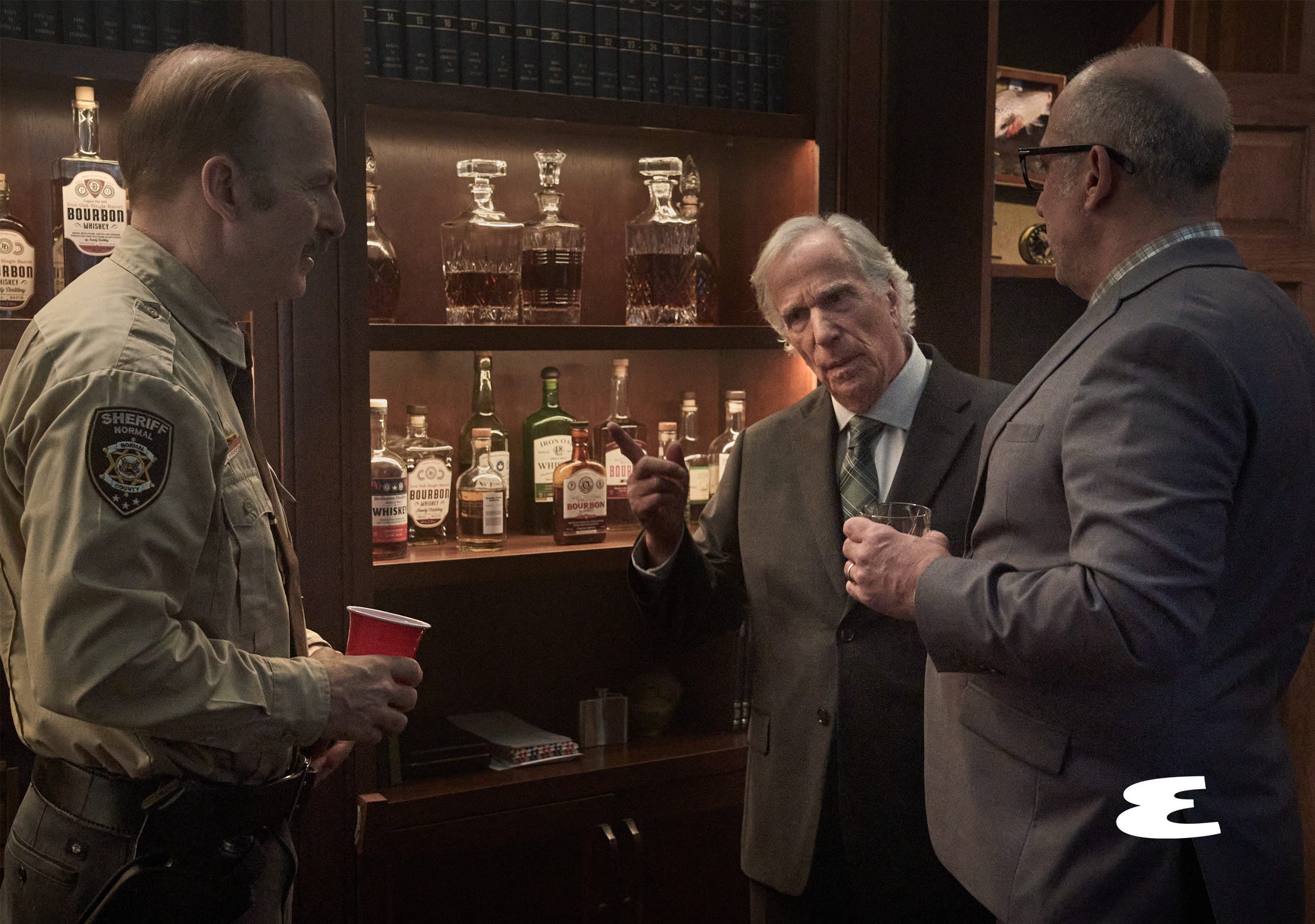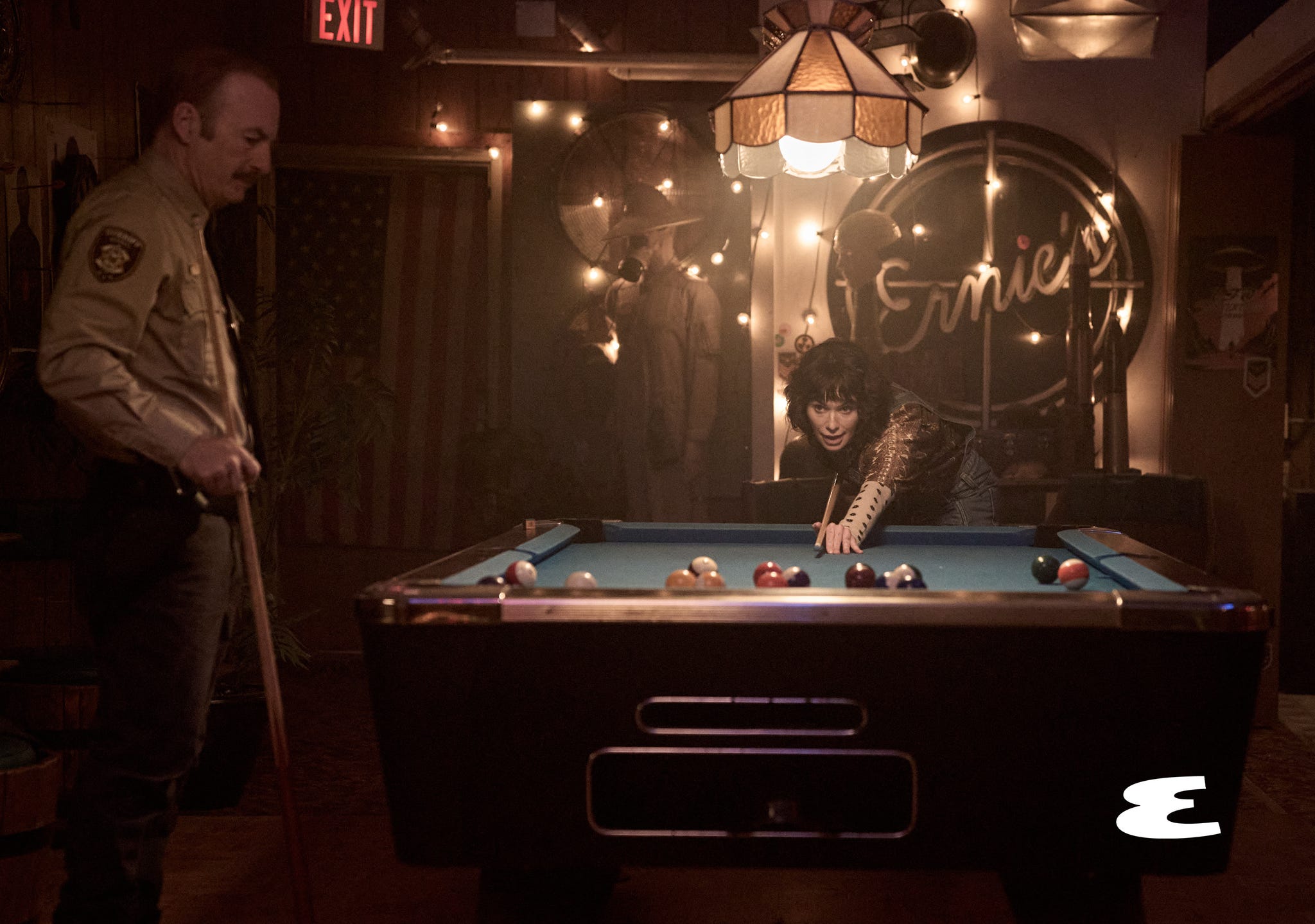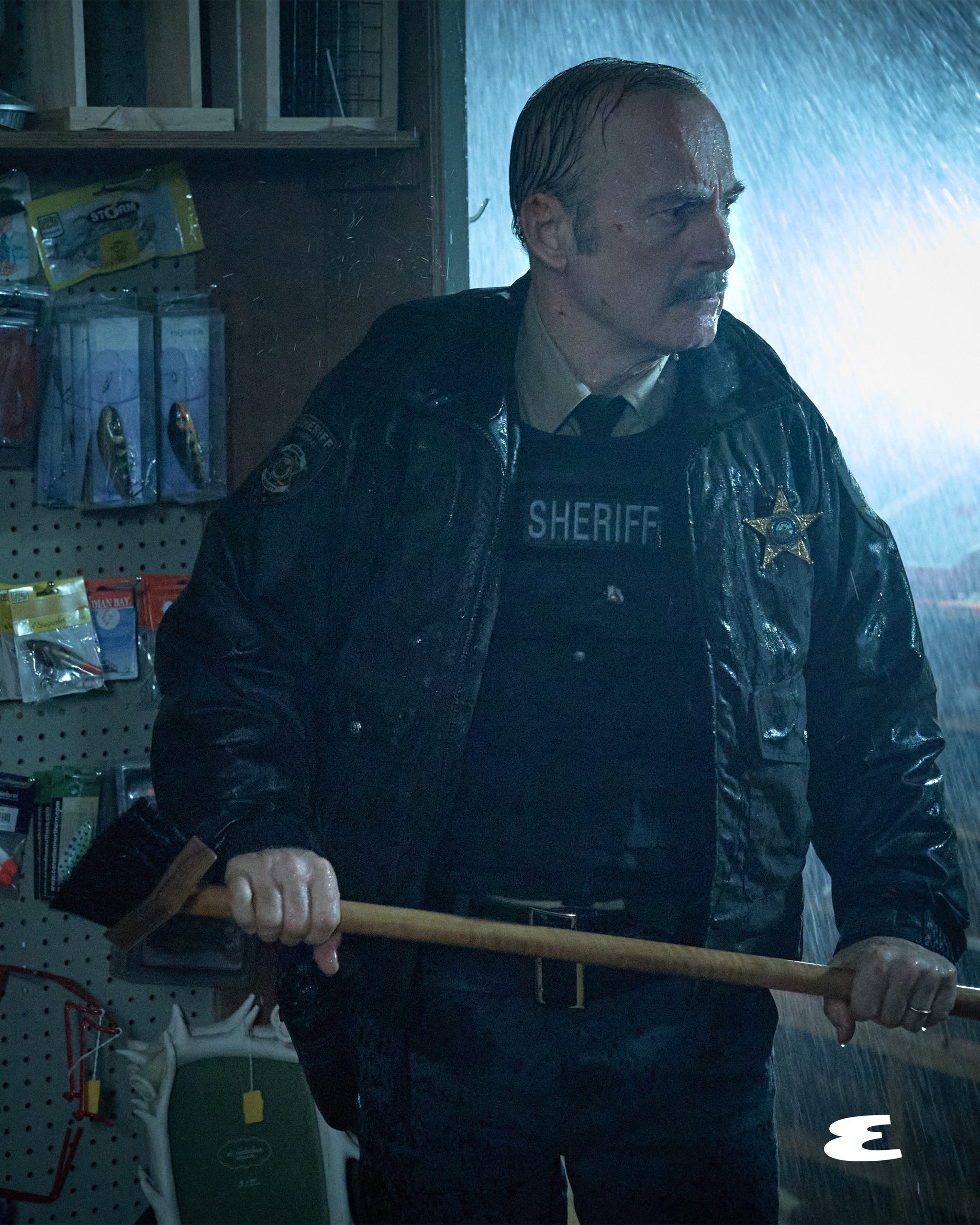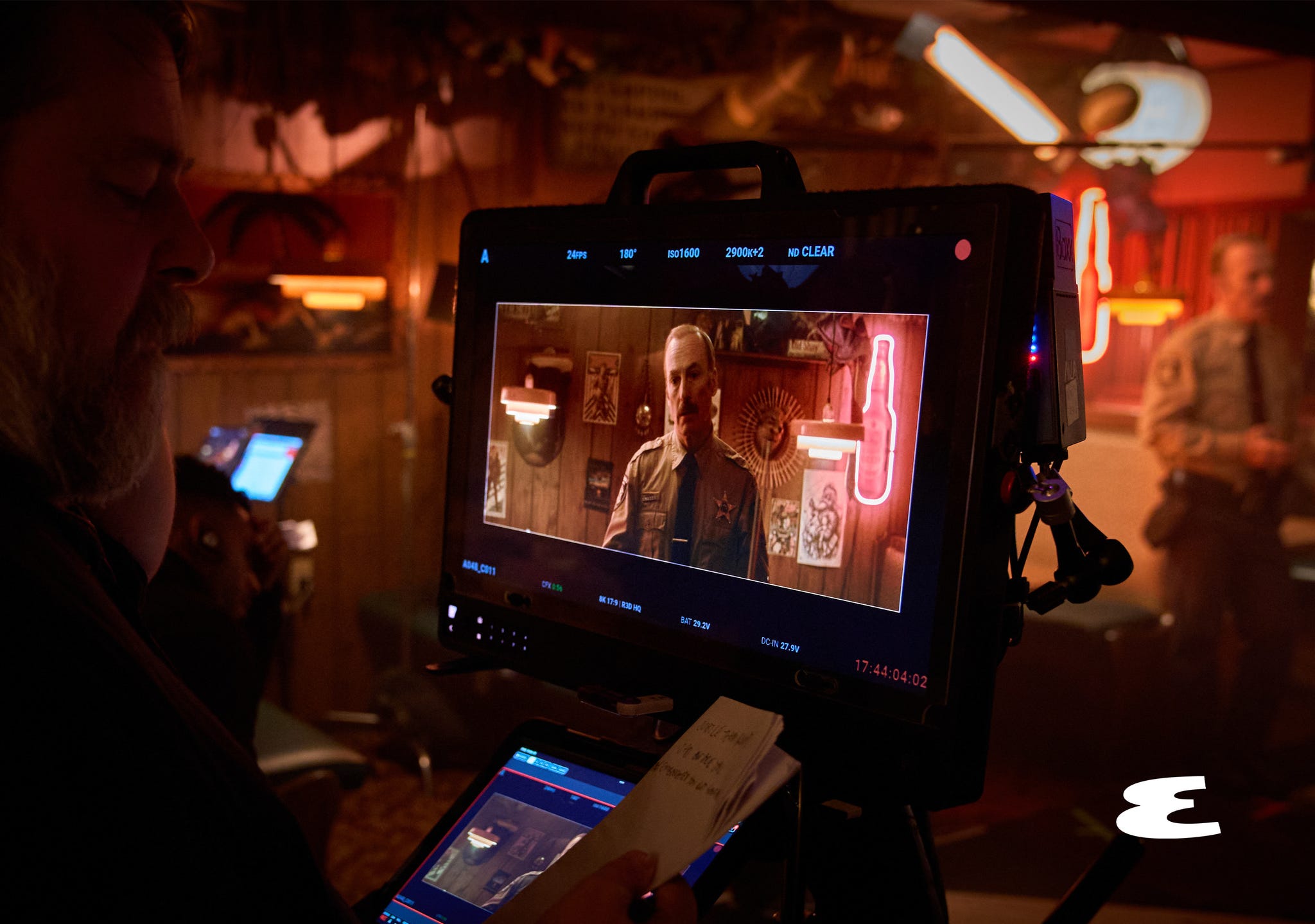Esquire First Look: Bob Odenkirk’s Weird-as-Hell, Gonzo Western, <em>Normal</em>

That which does not kill you makes you stronger. So goes the old saying, and in Bob Odenkirk’s case, that which made him stronger quite literally saved his life.
About six years ago, the Better Call Saul actor knew that his decade-long run as the sympathetic scofflaw attorney from Breaking Bad would eventually draw to a close, so he began devising an unlikely next chapter for a performer pushing 60: gunslinging, bare-knuckle action hero. “I said, Hey, I’m known as this character Saul who fights. He is clever. He never quits. He gets knocked around by life and he always comes back—and that’s an action character. Except he doesn’t fight, and I’m willing to learn to fight,” Odenkirk says. “I wonder if somebody would want to write me a story where I get to do that.”
John Wick screenwriter Derek Kolstad stepped up to answer the challenge, and they collaborated on 2021’s Nobody, about a seemingly meek middle-aged man who is trying to hide his past as a black-ops assassin. Odenkirk now believes the many months of muscle building and endurance training later saved him from a near-lethal cardiac ass-kicking that hit him while shooting the final episodes of Saul just months after Nobody’s debut. “It’s a really great secondary value,” he jokes.
His health was touch and go for a moment, but he eventually recovered from his heart attack so robustly that even his caregivers were surprised. “The nurse was like, ‘You have almost no scarring at all, and that’s because some of these other veins are bigger than normal. That fed your heart while you were getting CPR, so your heart didn’t start to scar up and die during that period where you weren’t having a normal heartbeat, which is rare,’ ” he says. “If what happened to me happened to anybody who wasn’t in shape or hadn’t trained and built out their heart vessels, they would have lots of very bad dead tissue. And I just don’t have it.”
In a sense, Odenkirk owes action movies a life debt. Fortunately, fighting for survival looks good on the now-62-year-old actor. He just starred in the sequel, Nobody 2, in which his low-key dad with a high-strung past tangles with hoodlums during a family vacation to a ramshackle water park. Kolstad also cowrote that one and collaborated with Odenkirk on yet another thriller, in which the actor’s character is far less self-sufficient in the self-defense department: a neo-noir modern western called Normal.
The indie movie will play on Sunday, September 7, in the Midnight Madness section of the Toronto International Film Festival, where it aims to find a distributor.

Odenkirk’s Sheriff Ulysses confers with Normal’s relentlessly cheerful Mayor Kibner (Henry Winkler) and Dr. Velie, the town physician (David Lawrence Brown).
Don’t let the name fool you. There’s very little run-of-the-mill about Normal, which takes its title from the fictional midwestern town at the center of this sinister story. Odenkirk stars as a disillusioned career lawman who takes a job there after the sudden (and unexplained) death of the previous sheriff. Unlike Why, Arizona; Boring, Maryland; and other American communities with dull-sounding monikers, Normal, Minnesota, is sleepy and quaint only on the surface. It’s actually populated by venomous townsfolk who have sold their souls to the money-laundering operation of a bloodthirsty international criminal cabal.
“There’s meant to be a little bit of A Prairie Home Companion, but the absurd is taken to a stronger place,” Odenkirk says. “The insularity of a small community can seem delightful. Everybody knows each other. But that can also feel like a pact has been made. ‘I’m not included in it, and I’ll never be included in it.’ And that’s got a scary context to it.”
In most westerns, the sheriff is there to protect the community from ruthless outlaws. In Normal, the sheriff is the one who needs protection from the town. “It’s an inverted High Noon,” says director Ben Wheatley.
Wheatley has a history of delving into the bleakest sides of human nature. His 2011 horror thriller Kill List was about hitmen ensnared in the occult, and 2015’s High-Rise starred Tom Hiddleston as a resident in a towering building full of crumbling psyches. Free Fire featured Brie Larson and Armie Hammer caught in a shoot-out between arms dealers, terrorists, and gang members and won the audience prize in TIFF’s Midnight Madness competition in 2015. So Normal’s presence there is a kind of homecoming for the filmmaker.
“It’s that section of cinema that isn’t necessarily too polite, you know?” Wheatley says. “It doesn’t play by the rules. The audience wants something that’s not just going to be a straight-up procedural or something that’s too predictable. I think this slips right in there.”
He describes Normal’s tone as gonzo. “You could imagine this would have played drive-ins back in the ’60s and ’70s,” the director adds.

Odenkirk’s local lawman plays a game of pool with barkeep Moira (Lena Headey), a fellow outcast in the insulated little town.
The story begins plainly enough, with Odenkirk’s Sheriff Ulysses muddling through his days as a substitute sheriff, making friends with the powers that be, like Henry Winkler’s glad-handing mayor, as well as outsiders like Moira, the hard-living local bartender, played by Game of Thrones’s Lena Headey. “Henry Winkler’s the nicest guy and has this friendly vibe, except when he snaps,” Odenkirk says. “And then Lena, she’s hip. She would be countercultural to the small town. She’d be an outcast.”
Exactly who is and is not involved in the underworld conspiracy is something for the movie to reveal, but ironically two people who aren’t part of the criminal scheme are the pair who decide to stage a stickup at Normal’s main-street bank. Played by Brendan Fletcher and Reena Jolly, the would-be Bonnie and Clyde inadvertently uncover a massive stash of ill-gotten gains inside the vault. Instead of arresting them, Odenkirk’s sheriff finds himself battling to save these crooks when the far more corrupt town residents turn murderous to protect their secret.
Normal only gets weirder from there. “You really see it through his eyes. He’s desperately trying to put the pieces together,” Wheatley says. “But really, what he’s on is a torch paper that’s being slowly lit, and then it just goes phwoomph! It ramps up and up and up, and by the end, you kind of stagger out of it.”
The one tether to reality is Ulysses himself, who remains true and honest. What you see is what you get. He has a haunted look and a troubled past of his own, but he wears all of that on the outside. He doesn’t have the bulletproof exterior of a Stallone or a Schwarzenegger, but that may be one of Odenkirk’s strengths as an unlikely action hero. “It’s pathos as much as anything,” Wheatley says. “He cares. You can feel him caring and worrying about the consequences of his actions.”
Yes, Odenkirk frequently gets beaten to a pulp in Normal, but the character had been beating himself up long before that. “He’s taking his licks because there’s a certain amount, a tiny bit, of self-loathing,” Wheatley says.
Amid the mayhem of Normal, Kolstad’s script also has a degree of social satire about the desperation sometimes found in small-town America. “Derek comes up with a lot of great movie plots, and this one got me,” Odenkirk says. “He sent me three outlines of different stories, and this is the one where I said, ‘Please, can you work on this?’ It has the suspense element, and also it speaks to the economic situation of so much of America, where it’s pretty rough out there. These little farming towns, they’re half empty and they don’t have any money coming in. I loved the comic commentary on: What do you do in this part of the country?”

Odenkirk’s sheriff uses whatever he can find to fight his way out: “This is High Plains Drifter with a load of industrial accidents put on top of it,” director Ben Wheatley says.
Fans might be forgiven for mixing up the Nobody films and Normal. There’s the similar-sounding N-titles, the everyman aspect, and a shared screenwriter. But Odenkirk saw the two protagonists as very different men, although both have their share of world-weariness.
Unlike his character in the Nobody films, who is essentially a Terminator in sheep’s clothing, Odenkirk’s Sheriff Ulysses is far less of a natural lethal weapon. He is good at improvising in a crisis and can throw and take his share of punches. But Odenkirk says that’s where the parallels end.
“The guy in Nobody is a powder keg who is more of a twisted soul,” he says. “We feel the weight that he is carrying around all the time when he’s not exploding. He is stuffing all of his wild feelings inside. And the guy in Normal is probably more of a normal guy. He’s trying to do his job, and he’s trying to give people room to be human. He’s for sure a little gun-shy. He’s made a mistake before misjudging people, and now he is so hesitant to take action that he almost misses the thing that’s going on in front of him. His instincts tell him something’s wrong in his town. And when he asks a question—‘How’d you raise that kind of money?’—he accepts a nonanswer.”
Sheriff Ulysses is trying hard not to be a hero and only steps up when there’s no other choice. “He sort of tries not to look at it. He doesn’t want to think about it,” Odenkirk says. “He doesn’t want things to explode. But he’s proficient when things go awry.”
Odenkirk helped devise the story in collaboration with Kolstad and says the name Ulysses was one of his contributions. It’s not meant to evoke the cunning hero of ancient mythology. It’s drawn from Civil War general Ulysses S. Grant, who was underestimated for much of his life before leading the Union to victory in that divisive, bloody conflict.
“I read a biography of Grant years ago, and I learned that his nickname, when he worked for his younger brothers back in Galena, Illinois, was ‘Useless,’ because he was terrible at what they asked him to do,” Odenkirk says. “He was kind of quiet; he mumbled. He didn’t step up and take control. And I wanted this character to be similarly underestimated by the people of the town. They look at him and go, ‘Well, this guy’s going to be great. He’s not going to ask too many questions. He’s not going to find out what’s happening in our town. And if he does, he’s not going to understand. He’s not very bright.’ ”

Director Ben Wheatley oversees a tense moment with Odenkirk in a behind-the-scenes shot from Normal.
Odenkirk understands being underestimated—and he knows what it’s like to get beaten up by the insecurities in your own head. “I’ve enjoyed these action films way more than I ever thought I would. I thought that I’d get laughed at suggesting that I could do them,” he says.
He was surprised when the Hollywood studios and producers embraced the idea. The strongest opposition came not from someone in the industry who doubted him but from a person who simply loved him and feared he would get hurt. “Initially there was resistance from my wife, who hates action films,” he says. “But she has relented.”
The Nobody movies and Normal have given him an outlet for something that was always simmering below his own surface. “There’s an intensity and rage that I have that I get to put somewhere when I get to make an action movie,” Odenkirk says. “I guess you could say I put it in a different space when I do comedy, but in this case, we have both mixed.”
Now he and manager Marc Provissiero have formed a partnership with Kolstad called Normal Productions to start more cinematic fights for him. Odenkirk knows that action movies are an unexpected detour, but moviemaking is a business built on twists. Case in point: After years spent brutalizing bad guys in films like those in the Taken series, Liam Neeson is now making silly comedies like The Naked Gun. Meanwhile, the star of Mr. Show has picked up the mantle of pulverizing enforcer.
“Something went wrong, yeah,” Odenkirk jokes. “Something’s gone wrong in the universe for that to be the case.”
esquire





